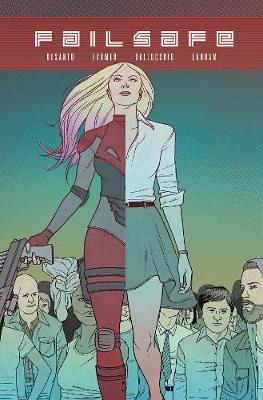Reviewed by Quirky Cat on
I received a copy of Failsafe through NetGalley in exchange for a fair and honest review.
Failsafe is a fairly classic example of science fiction meets worst case scenarios of government control. It’s set in the not-so-distant future, and takes liberties with both the technology available and the actions of people.
This is a fun and quick read, on the whole. I think it only took me about an hour to get through it, probably less. So if you’re looking for a quick bit of entertainment, especially if you’re a science fiction buff, then this may be the perfect thing.
Failsafe, in essence, is one man (with some allies) against the big, bad government. He’s not a great man, by any stretch of the imagination, but he’s good. He’s good at what he does, and he’s taken effort to make up for the wrongs in his past. Unfortunately for him, that made him the perfect person for this job.
Before I dig into the analysis of this graphic novel, I just want to say that the creators did one thing flawlessly, and I think they should get credit for that. They did a wonderful job of making most of their characters feel human. The ‘good guys’ had legitimate reasons for their actions, and the ‘bad guys’ were designed to make us indignant and happy to loathe them.
Failsafe is the tale of the government taking technology too far, to put it simply. Here we have people that have been randomly infected with nanobots, and those very nanobots can override the person’s desires, plans, and training. Basically it turns them into trained killers without the need for ever having to train them.
I think I would have been happier about this whole thing (okay, happy sounds pretty weird considering what happens here) had it been set into a farther present. Having it set a mere ten years away seriously cuts into the believability of the whole thing.
For one thing, it’s hard to believe that nanobots will have been designed so effectively that they were mass produced and introduced to the public in that short time span (we’ll ignore the bit about nobody noticing). Then there’s the presumably obvious political commentary on the government. Having it be only ten years in the future obviously implies that it’s the current government that did it. Some people would probably love that, while it’ll easily alienate others. Regardless of the personal feelings on the matter, having it set father into the future would raise more questions, open room for discourse, and give us time to believe more of it.
I wouldn’t mind seeing more from this world, truth be told. I wouldn’t say no to them jumping a bit forward in time though…but that’s just my bias showing through I suppose. Still, I can’t ignore the fact that they did a wonderful job of establishing the characters and giving us reason to care.
Reading updates
- Started reading
- 6 September, 2018: Finished reading
- 6 September, 2018: Reviewed
